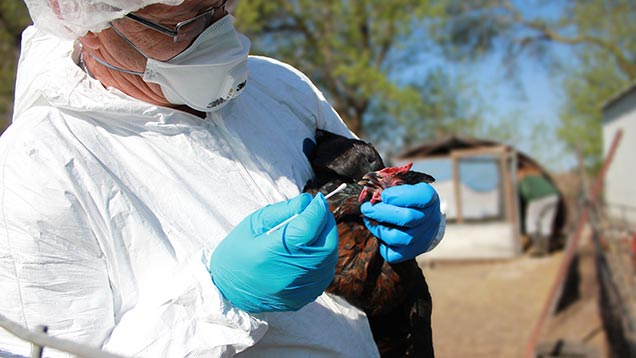US may suffocate poultry in bird flu outbreaks

Animal rights campaigners in the US have condemned a move by the authorities in Washington to allow ventilation shutdown as a means of culling commercial poultry in the event of another avian influenza outbreak.
The proposal is included in a new report from the Animal and Plant Health Inspection Service (APHIS) into preparations for a return of the disease which wiped out almost 50 million birds in the first half of this year.
APHIS makes clear that ventilation shutdown is “not a preferred method”. Filling sheds with foam or gassing birds in containers with carbon dioxide is the standard method.
See also: Bird flu threat escalates as virus mutates
But each situation will be assessed on a case-by-case basis and ventilation shutdown is still an option, says the report. It requires no specialised equipment and can be implemented immediately, helping the government achieve its goal of depopulating all affected flocks within 24 hours of the disease being detected.
But the Humane Society of the United States says it should not be used at all, claiming shutting down ventilation effectively “bakes the birds to death” over a number of hours.
“Animals suffer immensely with any outbreak of an epidemic like avian influenza, and we shouldn’t compound the problems for birds by subjecting them to a particularly miserable and protracted means of euthanasia,” said veterinary officer Michael Blackwell.
“The industry and APHIS need to find a better way to contain the spread of bird flu.”
APHIS counters that, while it is not a preferred method, “it could save the lives of thousands of birds by reducing the risk of disease spread”.
In the last outbreak – the worst animal disease in US history – it was taking up to two weeks to cull some infected flocks.
Preparations
As well as methods for culling, the report also describes improvements in on-farm biosecurity, better surveillance of wild birds, a new process for paying compensation to farmers and a draft vaccine strategy.
In particular, APHIS has decided to use dry cleaning and seven-day heating of affected sheds as the preferred method of eliminating the HPAI virus in future, rather than classical wet cleaning and chemical disinfection.
It has also agreed to pay a standard “per bird” rate to reimburse producers for the cost of cleaning up after an outbreak, with separate payments for cage bird and floor-reared operations.
This is deemed quicker, compared with the individual negotiations that went on in the last outbreak.
